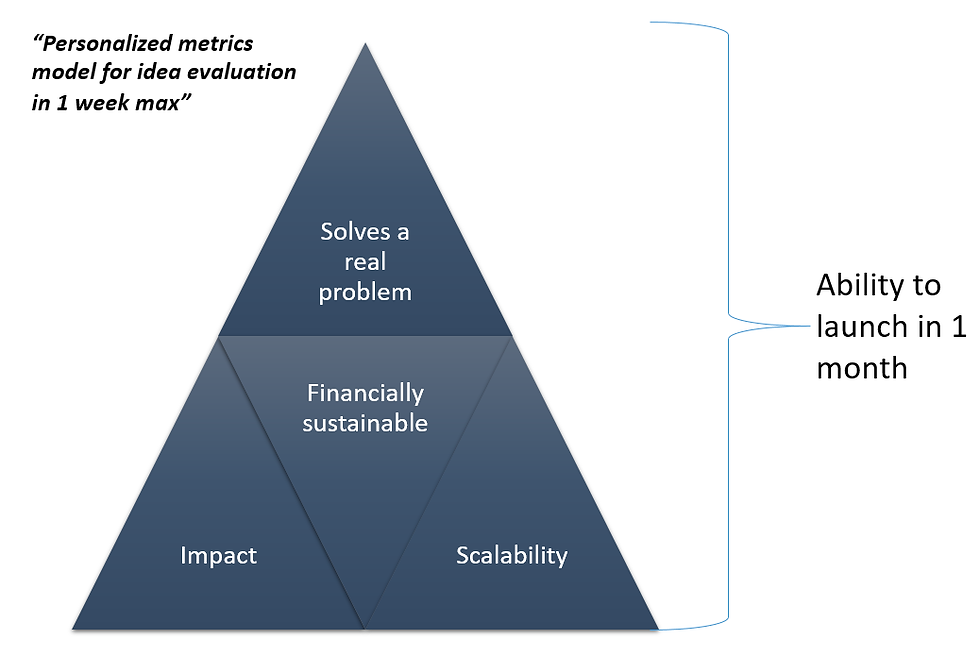Generating a good idea
- nikmurthy
- Jul 3, 2022
- 4 min read
A good friend of mine has been egging me on to post a few articles on various topics we were discussing, from being more creative to navigating the workplace. Whilst there was (and is) a certain amount of trepidation about putting my thoughts on topics on the world wide web (sounds scarier than “internet”) I thought I would give it a shot, so here we are. If you google “Where do ideas come from” you will find a vast range of theories to more loose correlations between different factors.
I think you will find that most of the “correlations” boil down to 5 factors(in no particular order):
Location = An incident/activity/thought directly linked to one’s present location spurring the “Eureka” moment. For example it could be making a conscious decision to sit in a coffee shop across town as opposed to your home and the idea coming from something missing in the coffee shop. Travel = Travelling on holiday/a day out or something that takes you out of your normal environment for an extended period of time. Ideas in this space come from spotting an inefficiency in the destination you are travelling to or adapting an idea from another travel destination. Time (Focus) = Thinking about a wider problem leads to a defined idea over a period of time. For example, you could be thinking about water shortages across the world and over time come up with a cost-effective water purification process.The key here is focussed time, much like your body sending a signal to your mind that you are thirsty and need some water its the perpetual focus that brings about breakthroughs. Adaptation = Hearing about a concept which works in a different industry or economy and applying it to another industry or the economy you currently reside in. This includes looking at ideas which perhaps didn’t work in the past because the world was not ready for it, but it could work today. The source of adaptation ideas could be events, meetings, conferences, networks. Interest = The idea is directly spurred on by books, magazine/news articles, podcasts and videos you have consumed. I have assumed that “you are finding a problem” and you “don’t have the problem today” (i.e. you haven’t stumbled upon it in your day job). The metrics discussed above are by no means“absolute” neuron firing / syncing theories but just something of a summary I made after trying to summarise what I read combined with my own experience. I tried the above theory over the course of a year a few years back. Over that year I have had 115 ideas worth considering, each with varying levels of viability. The chart below draws a relationship between the number of ideas and the metrics discussed earlier in the article. Now let’s look at each metric individually.

LOCATION

I was actually pretty surprised that my choice of location came last. I made efforts to put myself in different settings to work on ideas. After all in recent years companies have been trying to “hack creativity” by using location. The notion being put someone in a unique space, give them the tools to work and surround them with interesting and diverse people they will strive. I am not saying they won’t but perhaps these days employees almost expect this and as a result its true value may have diminished.
TRAVEL

I was pleasantly surprised by the volume of ideas I felt came to me as a result of travelling. I was previously of the mindset that one’s time could be better utilized by focusing on finding inefficiencies closer to home. TIME (Focus)

Ideas that come as a result of a continual thought process over a space of time have always intrigued me. For example, I traced back a more refined idea from a larger unwieldy problem I was looking at 6 months prior. I am going to look at this aspect more in the future by setting some large problems for my team to tackle and monitor their progress over the course of a year. ADAPTATION

In my case I wasn’t too surprised that adaptation came up tops, I would blame/credit (!) my consulting background where we constantly make comparisons between industries and solutions to come up with better processes. So in my case I need to continue to going to more talks from different industries/people as this seems to be the major source for ideas. I do think in most cases adaptation occurs somewhere down the line. INTEREST

Interest has come in for the silver medal. It has shown me that I need to allocate more time to reading/viewing/listening to things I find intriguing / want to pursue further. I have tried to set aside 30 minutes every morning for the last week to read/view/listen to something before I start the working day so let’s see how that goes.
EPILOGUE
So I hope that’s given you some food for thought and as you can see from the above, there is no magic answer — I conclude by stating the obvious — its whatever works for you! Perhaps performing a similar exercise would help you better understand the sources that give you the most inspiration. I would love to hear from you on your thoughts/experiences/ideas.
It goes without saying that ideas are nothing without execution but more on that in another post.
Oh and one last thought — if this has left you intrigued about the idea thought process check out this great TED talk from Steve Johnson:

Comments